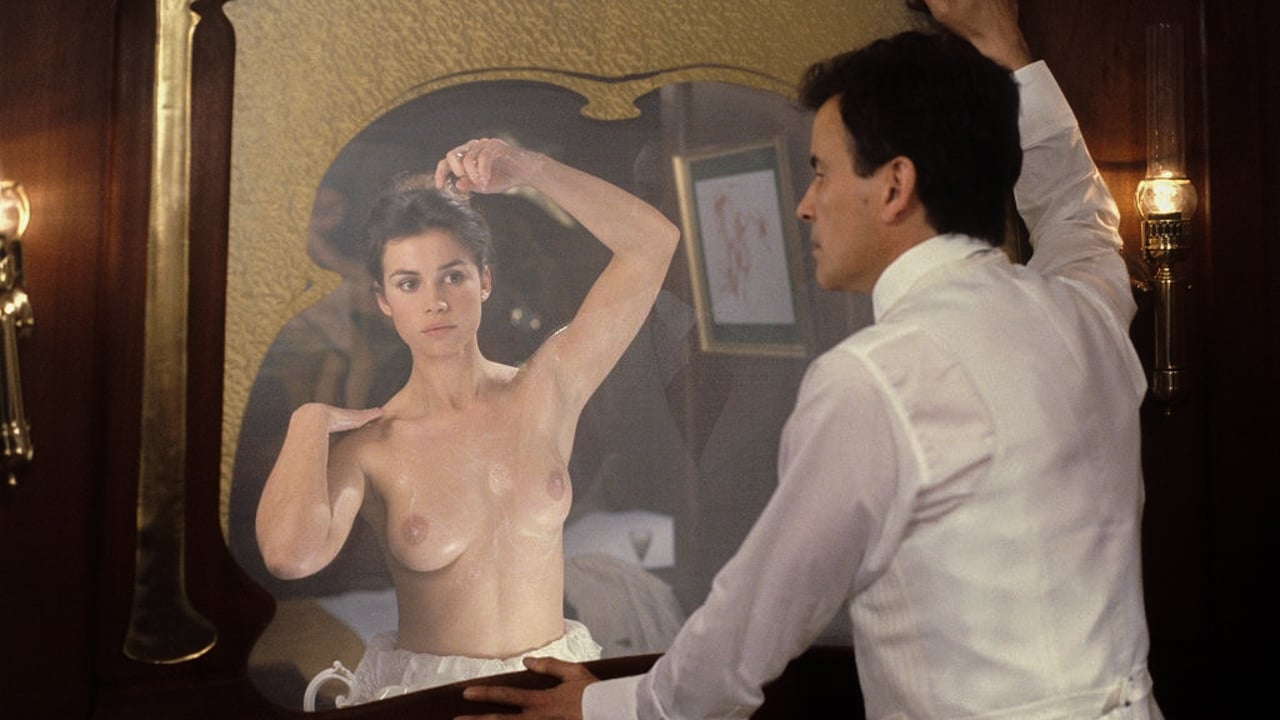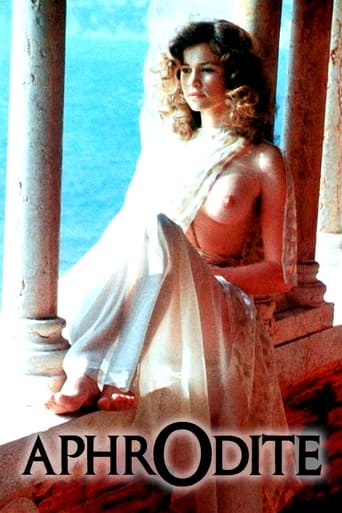

Let's be realistic.
... View Moreeverything you have heard about this movie is true.
... View Morea film so unique, intoxicating and bizarre that it not only demands another viewing, but is also forgivable as a satirical comedy where the jokes eventually take the back seat.
... View MoreThis is one of the few movies I've ever seen where the whole audience broke into spontaneous, loud applause a third of the way in.
... View MoreSetting this piece of period drivel in 1914 suggests that the creators were trying to add significance by telling a tale of upper class decadence as Europe teetered on the brink of war, but chalk this up as another in a long list of failed ambitions for this piece of drek. Every erotic taste is featured here: voyeurism, costumes, role-playing and partner-swapping as events lead up to the main event, a re-creation of a classical Greek orgy. However, while the settings are pretty to look at, the performances are so drab, the script so lacking in energy and wit and the direction so pedestrian that it all makes for a boring, empty spectacle. Plus, the English-dubbed North American version appears to be a few minutes shorter than the European version, indicating some scissoring by censors. Avoid.
... View MoreThis is quite a short film and I have seen it many times - it is one I really enjoy, but I make no claim that it is an outstanding work. It has many strong points and also many weaknesses. As the strong points are mainly features that I look for in a film, and the weakness are those I am usually prepared to overlook, I have given it an overall rating of eight. Someone with very different interests could equally legitimately give it a rating of three - both would be perfectly responsible and logical assessments. It is a French film with Pierre Louys and Jean Ardy given the principal writing credits. In 1885 Pierre Louys wrote a novel 'Aphrodite' about the worship of the Greek God of Love in Alexandria at the beginning of the Christian era. This film relates to a party of rich near aristocrats on a private yacht cruise among the Greek islands in 1914 just before the start of World War 1 - the film ends with the party on the yacht receiving the news of the assassination of Archduke Ferdinand in Sarajevo, the event which triggered the start of the war. This story cannot follow the novel, but it depicts a re-creation by the passengers on the yacht of a three day festival associated with Aphrodite that used to be celebrated at the time of a particular astronomical conjunction (which recurs every 50 years, and took place again during the cruise). Subject to correction, I assume that the writing credit paid to Louys was associated with either the fictional creation of this festival, or his re-telling of some legendary account of it; and Ardy was essentially responsible for writing the film-script. The points I admire and enjoy about this film can be listed as follows:(1) It was set in an extremely interesting period - the rigid strictures of Victorian society were being abandoned but the Edwardian class structure, with its emphasis on birth and position rather than wealth, was only just beginning to crumble in Europe - this process was greatly accelerated by World War I.(2) The unspecified islands, with rambling Mediterranean villas and carefully tended gardens, which provided the background setting for the cruise were delightful(3) The large steam yacht with paid crew which was used for the film creates a wonderful period atmosphere, and is well worth contrasting with the small yacht without crew from the same period which is featured in 'The Riddle of the Sands'. (4) The Edwardian costumes worn by both the men and the women were a joy to view - although it was easy to see why these fashions were abandoned once leisure became more limited.(5) I really enjoyed the film's leisurely pace, which in the twenty-first century seems almost too restful, but which permits the gradual development of characters in a way we seldom see today. (6) The soft focus photography with muted colours was a joy to watch(7) The dialogue contained many political allusions to significant characters or incidents from the period, all of which I enjoyed. It was more gracious but more rewarding than that in most contemporary films.(8) The light classical music used in the background was perfect for matching the mood of the film.The most common criticism of this film is that the re-enactment of the ancient Aphrodite festival was nothing more than an excuse to justify a number of semi-nude sequences. Whether or not true, if this is how you regard the story presented in the film you will probably not enjoy it. (My comment is that its stars were always a pleasure to look at - usually when wearing their beautiful Edwardian gowns, but occasionally relatively unadorned. Both these alternatives were visually more rewarding than modern T shirts and shorts or bikinis could ever be.) Nevertheless such criticisms; and various others from viewers who do not enjoy soft focus photography, muted colours, meaningful dialogue rather than shouting and yelling, or classical music; may all provide good reasons for some viewers not to watch this film.There is a whiff of espionage associated with this cruise, but the theme is not followed up in any detail. The principal character is Harry Laird, a munitions dealer (played by Horst Bucholz) and this leads to some quite stimulating dialogue about the practicability and morality of trying to achieve security through invulnerability. The early twentieth century will probably becomes historically recognised as the beginning of the era of "Weapons of mass destruction", and knowing these discussions take place on the eve of WW1 makes for quite powerful viewing. However the main story is probably the way in which Harry persuades the guests on the cruise to take part in his planned re-enactment of pagan rituals, and the dilemma of the girl who hates the idea of taking the part of Aphrodite which was allocated to her, but faces personal circumstances such that it becomes almost impossible for her to refuse. Some viewers have complained that the film has no definite ending but just peters out. This seems absurd - the film fairly successfully attempts to re-create characters clearly identifiable with pre-WW1 Europe, and it would be hard to improve on ending it at the start of the war which will destroy their society for ever. Perhaps it is best regarded as something of a stylistic exercise rather than as a conventional drama.
... View MoreSPOILERS: The event that began World War I is mentioned here. If the movie Titanic was spoiled for people who knew the ship sunk, then my review has similar "spoilers" that are also known as basic facts of world history from the 20th century.Set on an undisclosed European isle in the summer of 1914, this movie is part costume drama and part soft porn, with some espionage and political intrigue mixed in for good measure.For those who've read the first book in Upton Sinclair's Lanny Budd series, "World's End", this will seem like old times with it's yacht cruises, painters, political discussion, and the dropping of names of many highly placed European personages, and the mentioning of the most prominent munitions manufacturers of the period, including Count Basil Zaharoff.There is almost enough dialog, sometimes political and sometimes philosophical, to fill in the spaces between the nudity and sex, some of which is erotic, and some of which is absurd. For fans of Valerie Kaprisky, you may be disappointed after the first 10 minutes of the movie.The film ends with the news of the assassination of Arch Duke Ferdinand and its importance to the main character of the film, a munitions manufacturer, which is shown next to the declaration of love by the other main characters, perhaps in some sort of suggested dichotomy of love and war within all men. But truly, it's the charm of this film that it hints at such concepts interspersed with ridiculous love scenes, and does so without any apparent shame.
... View MoreThis movie is French but the dialog is mostly English. The story takes place on a Greek island in 1914. The costumes are very nice and evocative of the period with lots of hats, frills, and ruffles. The sets are great, too (a palatial island villa with lots of gardens and statuary). The cast is very pretty, and the story is fairly interesting too. It ends rather abruptly and there is no sense of completion, but that's a small complaint. It is shot in a pretty, soft-focus way, with a very nice classical music soundtrack. Well above average for this kind of thing.
... View More